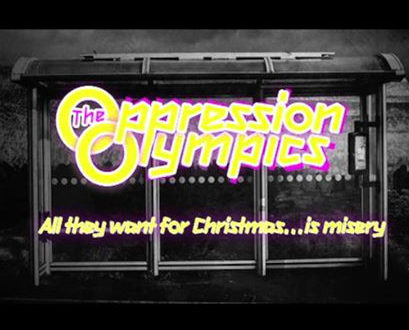Pros: The plot makes a good point about empathy and self-pity.
Cons: Too many scene changes in the first half disrupt the flow of the play.
Summary
Rating
Poor
Arguably victim of a post-Edinburgh re-writing, this human drama falls short of its premise.
The scene cuts abruptly and the bus stop is transformed into a sexual health clinic waiting room, where young single mother Hayley (Elicia Murphy) engages in an awkward conversation with young gay man Alex (Jacob Kat). She doesn’t hide that motherhood feels like a burden to her and his entire life seems to revolve around his sexual orientation. Of all the main characters, Alex is the most underdeveloped: his rage towards the rest of the world comes across as poorly depicted and scantily accounted for.
After another sudden cut, the clinic becomes a police interview room where a female police officer takes Ruth’s statement. After she confesses that she had intended to use the firearm on herself and the copper turns out to be her friend, she’s immediately released, and the boy, Milo (Will Stewart), convinced to drop the charges.
In the 50-minute long first half, I counted ten different scenes, all marked by a set change with lights down and loud music. The result of this was that despite being easy to follow, the plot ended up crumbled into too many and too short interactions. Perhaps it could have worked better with a more adaptable set to allow the many scenes to be played seamlessly back-to-back. A gentle background soundtrack and a noticeable change in lighting might also have helped to guide the attention of an audience perfectly willing to suspend disbelief in that small space. Also, the flow would perhaps have felt sharper with a smaller cast: minor roles could have been doubled or conducted off stage – in a phone call, for example.
Playwrights Mark Bittlestone, Will Penswick and Will Dalrymple touch some relevant and rarely explored topics, like the high incidence of suicides within the LGBT community. This alone, could have easily been the centre topic, although it only makes a few appearances between the lines and is not appropriately supported by real events. Other issues like grief, loneliness, divorce, sexual inhibition and family support are mainly touched in passing and, with a few comedic additions, result in the play being suspended somewhere between a gloomy TV drama and a clumsy dark comedy attempt.
A suitable word to describe my first impression after the show would be ‘confused’, as I couldn’t fathom how the same production that has received praise in Edinburgh, during the last fringe festival, fell flat on the London stage. A reasonable explanation would lay in the decision to extend the work beyond its original 50-minute running time; comparing the blurbs and reading the Edinburgh reviews, it would appear that the plot has undergone some major alterations. Critics had expressed consistent appreciation for the crisp writing and timely comedy value, both elements that I failed to identify in this occasion.
If my impression is right, I urge the creatives to reinstate some of the previous features, giving back the freshness and relatability that were lost in this re-writing. As is often the case, less is more: a single-act fringe play doesn’t necessarily benefit from expansion to be considered an accomplished piece of theatre.
Authors: Mark Bittlestone, Will Penswick, Will Dalrymple
Director: Millie Foy
Producer: StraightUp Productions
Box Office: 020 8050 3025
Booking Link: https://www.breadandrosestheatre.co.uk/the-oppression-olympics.html
Booking Until: 22 December 2017
 Everything Theatre Reviews, interviews and news for theatre lovers, London and beyond
Everything Theatre Reviews, interviews and news for theatre lovers, London and beyond



